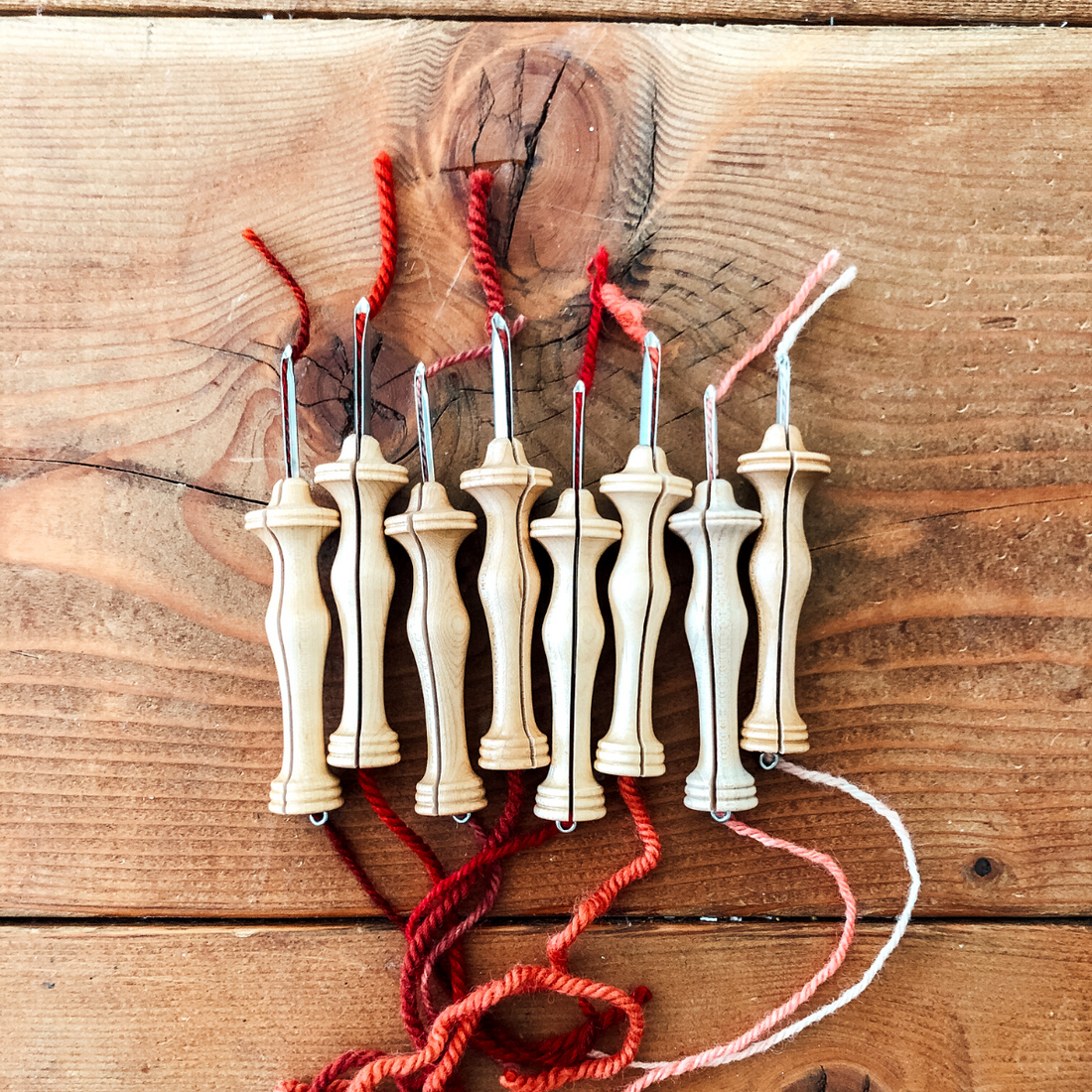The tool most fundamental to Punch Needle is, you guessed it, a punch needle! Can’t complete the craft without it! I find that a lot of first time punchers are super intimidated by which tool to choose because there are so many options! For this reason, I am going to break this down into two very simple categories: Adjustable & Fixed. Both categories have pros and cons and it totally depends on what you prefer working with.
Adjustable Needles: These are needles that allow you several different loop length options in one needle. This needle is particularly handy if you like creating texture in your work by switching between loop lengths. It also means you may spend less money because you only have to buy one needle to get several different lengths.
The downside to adjustable needles is you are limited by what yarn you can use. Most adjustable needles accommodate fine to medium weight yarn, but not extra thick. That’s something to consider if you prefer working with a particular weight of yarn. The other thing I don’t love about adjustable needles is they require a wire needle threader. Wire threaders are just another thing you have to make sure you don’t lose or break when punching. It also adds time between changing colors and can be a real hassle should you accidentally unthread your needle.
If you are a beginner puncher and you’d like to test the waters without spending a fortune, I recommend the Lavor Adjustable Needle. This is my favorite adjustable needle to use and has a great variety in loop lengths. It’s not as comfortable as an Oxford for long-term punching, but it’s great for the cost.

Fixed Needles: Fixed needles offer one loop length per needle. This may seem like a downgrade compared to the adjustable, but the upside is you can find a better variety of needles to accommodate different thicknesses of yarns. The Oxford Needle is a fixed needle that comes in 8 different needle sizes. The sizes vary in loop length and width so each needle is perfect for either fine or thick yarns. What I love most about the Oxford is the ability to thread it quickly. Threading this needle is so easy! It also has a fantastic punching experience. The needle glides through monks cloth very easily.
The Oxford needle can be a turn off to first-time punchers because you may not be sure which size to get. I personally recommend getting two sizes -- one for thick yarn and one for thin. If it were me, I would get the #10 regular for thick and the #13 for fine yarns. With these two options, you should have all the flexibility you need in two needles.
However, if you aren’t ready to drop $80 on two punch needles, a basic punch tool like the one in my “Begin-to” Punch Needle Kits is a great option! This needle does require a threader, but it is great to punch with and looks nice, too.

Adjustable Needles: These are needles that allow you several different loop length options in one needle.
Pros:
- A lot of versatility from one tool
- Cost-effective
Cons
- Requires a needle threader
- Doesn’t accommodate a large variety of yarn thicknesses
Fixed Needles: Fixed needles offer one loop length per needle.
Pros:
- Doesn’t require a needle threader
- Lots of options for different yarn weights
Cons:
- You need multiple needles to create different pile heights
- Can be expensive if you want several needles.
Of course, there are plenty of other needle options -- these are just two of my favorites! If I had to tell you to buy just one though, It would be the Oxford #13. This needle is the one I go back to again and again. Also, it is compatible with any kit in my shop (hint, hint).
Questions about needles? Let me know!





3 comments
Would a oxford 14 punch needle be similar to a 13?
Would a oxford 14 punch needle be similar to a 13?
Bonjour
Comment on achète le matériel pour réaliser un tapis.
Merci beaucoup bonne journée
R .PIBOULEAU